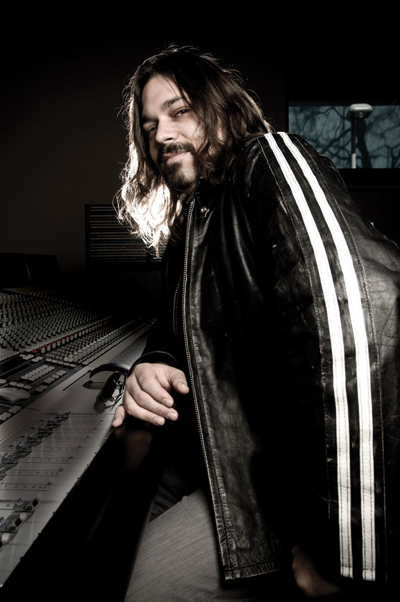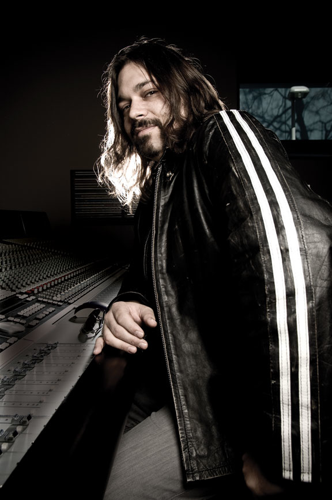Producer Nick Raskulineczhas been nominated for 16 Grammys and has taken home three of them. Together, the records this Knoxville native and now Nashville resident has shaped have sold over 15 million copies, and he's finessed the recordings of bands who have untouchable indie cred (Superdrag), nerd cred (Rush) and teen cred (Paramore), not to mention a slew of rock and metal in between (Danzig, Queens of the Stone Age, Death Angel). His success story — dude moves to L.A., fetches coffee at a world-famous studio (Sound City), works his way up to assistant engineer, then breaks out on his own — would verge on cliché if it weren't for one significant detail: His whole life changed when he ran into Foo Fighters frontman Dave Grohl in a parking lot.
"It was this place called Mates — a rehearsal studio in California," says Raskulinecz, who evokes a Jack Black-like enthusiasm for rock 'n' roll, over a sweet tea in a downtown Franklin cafe. "I was trying to make it as an independent engineer. Me and my chick were struggling — we were broke as a joke. I actually called my mom to let me borrow 30 bucks. We were thinking about moving back to Knoxville."
Enter Dave Grohl. Raskulinecz had met Grohl at Sound City once before when he popped in to record a single. Raskulinecz happened to be assistant engineering at the time. They'd kept in touch occasionally, but the parking lot's right-place-right-time luck was still serendipitous.
"He was like, 'I'm getting ready to go back to Virginia. I have a recording studio in my house and I want to make a record there. What are you doing for the next few months?' "
Raskulinecz had already committed to work on Last Call for Vitriol for his Knoxville buddies Superdrag, a follow-up to his work on Fabulous 8-Track Sounds and Valley of the Dying Stars. But five years of toiling out west still wasn't paying off.
"I just didn't have the same passion for it," he says. "It was a really hard decision. I was pacing around my apartment with me and my wife, Amber, talking about it. And she was right. She was like, 'You can't not do this. This is what you've been waiting for.' "
Raskulinecz followed the road to Virginia. The Foo Fighters record, One by One, augmented the band's mainstream success and confirmed Raskulinecz's credibility as a producer. "We all lived together and had a fucking blast and it turned out great," he recalls. "And we had three hit songs and a couple of Grammys for it, and it sold like 2 millions copies. That changed everything for me. That took me from obscurity — this local dude kinda starting to make a name for himself — to making major-label projects since then. And I haven't stopped."
Raskulinecz now finds himself in the company of radio hit-makers Rick Rubin and Brendan O'Brien, with a who's who of big-time clients on his résumé. Highlights include Rush — "Standing in the room with Neal Peart and physically guiding him through fills and cymbals I want him to hit at specific times, and he's watching me like a hawk, and when it's over just high-fiving and going, 'Yes!' " — and laying down a piano track with unexpected Alice in Chains fan Elton John on the the title track off the band's comeback record, Black Gives Way to Blue. ("I just had to catch myself," says Raskulinecz. "I made him play it a bunch of times, and they [the band] were looking at me like, 'Are you crazy?' But, you know, even though it's Elton John, it's still gotta be great.")
Raskulinecz's move to Nashville brings him closer to his Knoxville roots, and to a studio-heavy town where he's more comfortable raising a family. "I don't want our daughter growing up 25 minutes from Hollywood where nothing is real," he says. He brings with him an old-school etched-in-tape work ethic that he's been employing in studios around town, including Sound Kitchen, Blackbird and The Castle in Franklin. (He's currently at work recording Stone Sour in town at an undisclosed location.)
And while he embraces the new technology of record-making, he laments an industry where the back end of income — money from record sales — has diminished substantially due to illegal downloading. Where fewer bands seem to possess rare talents. Where recording no longer requires the attention that comes from building sound from the ground up. "It's taken me 15 years to make drums sound how they sound," he says as example. "That's the hardest thing to record is a drum sound. And now you can download the greatest snare sound in the world for free."
And though he has no plans to go country any time soon, he's passionate about discovering new rock acts, particularly in Nashville. So take note, local bands."I still listen to everything I get," he says. —TRACY MOORE
Photographed by Eric England at Blackbird Studios in Berry Hill.






